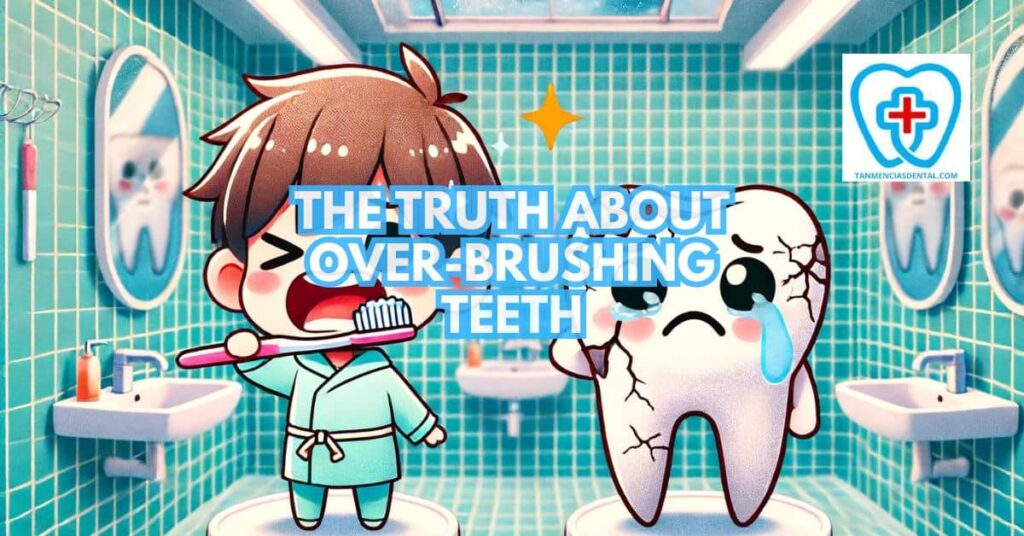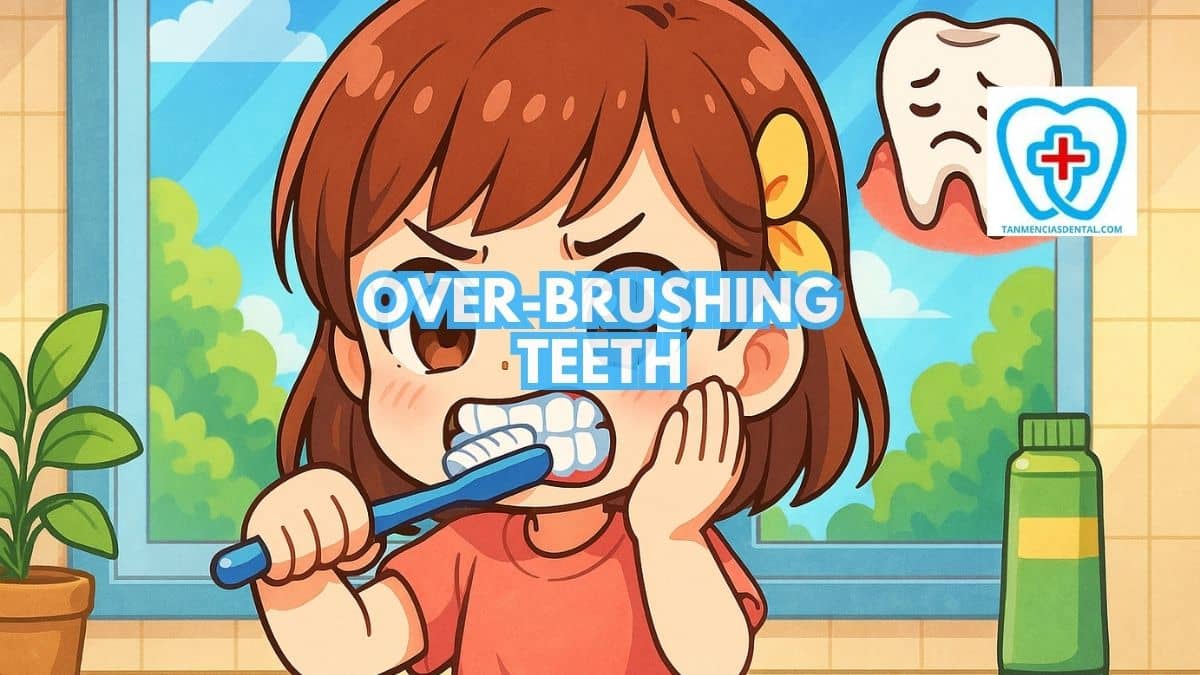Brushing your teeth helps keep your mouth clean and your smile healthy.
But brushing too hard or too often—called over-brushing teeth—can actually harm your enamel and gums.
Many people don’t realize that too much brushing can wear down teeth and cause pain or sensitivity.
We’ll explain how to brush the right way and avoid damage from over-brushing.
By learning proper brushing habits, you can protect your teeth and keep your mouth healthy for years to come.
1. Why Oral Hygiene Matters
Taking care of your mouth is not just about having clean teeth—it helps keep your whole body healthy.
Poor oral hygiene can cause plaque to build up, which may lead to tooth decay, cavities, and even tooth loss.
When plaque is not removed, it can also irritate the gums and cause bleeding gums, which is an early sign of gum disease.
If gum disease gets worse, it can damage the bones that support your teeth and lead to tooth loss.
Gum infections can also enter the bloodstream and have been linked to heart problems and diabetes.
Brushing twice a day with fluoride toothpaste helps protect your tooth enamel, which is the hard outer layer that keeps your teeth strong.
Flossing daily and visiting the dentist regularly are simple ways to avoid serious problems and keep your mouth feeling fresh and healthy.
🦷 How Often Should You Whiten Your Teeth for the Best Results?
2. Brushing Bliss or Brushing Bust? Understanding Over-Brushing
Over-brushing happens when you brush your teeth too hard or too frequently.
This can damage the enamel, the protective layer on your teeth, making them more vulnerable to decay.
It can also cause gum recession, leading to sensitivity and potential tooth loss.
Striking a balance is crucial for maintaining oral health.
Gentle, effective brushing twice a day is usually sufficient.
🦷 What’s the Real Cost of Dental Cleanings?
3. Enamel Under Attack: How Over-Brushing Erodes Your Teeth’s Defense
Tooth enamel is the hard outer layer of your teeth that protects them from decay, heat, and cold.
Brushing too hard or using a stiff toothbrush can cause toothbrush abrasion, which can wear away the enamel over time.
When enamel wears away, the softer layer underneath, called dentin, becomes exposed and can make teeth feel sensitive to hot or cold.
Unlike other parts of the body, enamel cannot grow back once it’s gone, so preventing damage is very important.
To avoid enamel loss, use a soft-bristled toothbrush and brush gently in small, circular motions instead of scrubbing.
Avoid brushing right after eating acidic foods or drinks, as this can increase the risk of enamel damage.
A dental hygienist can help you learn proper brushing habits and check for early signs of enamel wear during your regular cleanings.
🦷 What Happens If You Skip Brushing Before Bed? The Surprising Effects on Your Teeth
4. Receding Gums: The Brushing Habit Backfiring on Your Smile
Aggressive brushing can cause your gums to recede, pulling away from the teeth and exposing the roots.
This not only makes your teeth look longer but also increases sensitivity and the risk of cavities.
Receding gums can lead to serious dental issues, including tooth loss.
It’s important to use gentle, circular motions and a soft-bristled toothbrush to protect your gums.
Regular dental checkups can help catch early signs of gum recession and prevent further damage.
🦷 How Dental Diagnostics in Marikina Are Changing the Future of Oral Health

5. Brushing Technique: Mastering the Moves for a Healthy Clean
Proper brushing technique is crucial for effective cleaning and avoiding damage.
Hold your toothbrush at a 45-degree angle to your gums and use gentle, circular motions.
Make sure to brush all surfaces of your teeth, including the fronts, backs, and chewing surfaces.
Spend at least two minutes brushing your teeth, and don’t forget to brush your tongue to remove bacteria and freshen your breath.
Using the right technique ensures a thorough clean without harming your teeth or gums.
🦷 The Ultimate Guide to Wisdom Teeth Recovery: How to Follow the Food Timeline
6. When to Change Your Toothbrush and Why It Matters
Over time, the bristles on your toothbrush become worn and less effective at removing plaque.
Worn bristles can also cause tooth sensitivity if they are too rough on your gums or enamel.
If you brush too often or too hard, the bristles may fray even faster and stop cleaning your teeth properly.
Old toothbrushes can also collect bacteria, which can spread in your mouth and lead to bad breath or gum problems.
Dentists recommend that you replace your toothbrush or electric brush head every 3 to 4 months.
You should also change it sooner if the bristles look bent, frayed, or feel too soft to clean well.
Using a clean, well-shaped toothbrush helps protect your teeth and gums and supports better oral hygiene overall.
🦷 Can Pineapple Juice Speed Up Your Wisdom Teeth Recovery? Uncovering the Truth
7. Finding Your Brushing Rhythm: How Often is the Right Amount?
Brushing twice a day is generally recommended for maintaining good oral health.
More frequent brushing can cause enamel wear and gum damage, while less frequent brushing can lead to plaque buildup and cavities.
It’s important to find a balance that works for your oral health needs.
Morning and night are the best times to brush, with nighttime brushing being particularly important to remove the day’s buildup.
Consistency in your brushing routine is key to keeping your teeth and gums healthy.
🦷 How Do Dentists Fix a Broken Tooth? The Step-by-Step Process Explained
8. Manual or Electric: Unveiling the Power Brush Debate
Electric toothbrushes can be more effective at removing plaque and reducing gum disease than manual toothbrushes.
They provide consistent brushing motions and often come with timers to ensure you brush for the recommended two minutes.
However, a manual toothbrush can be just as effective if used correctly with proper technique.
The choice between manual and electric often comes down to personal preference and comfort.
Consulting your dentist can help you decide which type is best suited for your oral care needs.
🦷 How Long Does a Teeth Cleaning Take? What You Can Expect at Your Appointment
9. Brushing Isn’t Enough: Why Flossing Is Your Partner in Crime
While brushing cleans the surfaces of your teeth, flossing reaches the spaces between them where a toothbrush can’t.
Flossing removes plaque and food particles stuck between teeth, reducing the risk of cavities and gum disease.
It’s an essential part of a complete oral hygiene routine.
Ideally, floss at least once a day, preferably before brushing at night.
Combining brushing with flossing ensures a thorough clean and healthier teeth and gums.
🦷 When Can You Use White Strips After Brushing? Here’s What You Need to Know
10. Listen Up, Teeth! Recognizing the Signs of Over-Brushing
Over-brushing can lead to noticeable signs like sensitive teeth, receding gums, and worn enamel.
If your teeth feel more sensitive to hot or cold, it might be due to enamel erosion.
Gums that are pulling away from your teeth indicate aggressive brushing.
Additionally, if you notice notches at the base of your teeth, it’s a sign you might be brushing too hard.
Recognizing these signs early can help you adjust your brushing habits to prevent further damage.
🦷 How Quickly Can Cavities Develop with Poor Brushing and Flossing? The Alarming Truth
11. Consulting Your Dentist: The Key to a Personalized Brushing Blueprint
Regular dental visits are crucial for maintaining optimal oral health.
Your dentist can assess your brushing technique and frequency, providing personalized advice tailored to your needs.
They can recommend the best toothbrush and toothpaste for your situation and offer guidance on proper brushing and flossing methods.
Regular checkups also help catch any issues early, preventing more serious problems down the line.
Trusting your dentist’s expertise ensures you’re taking the best possible care of your teeth.
🦷 Quality and Affordable Dental Services in Marikina City
👨⚕️ Conclusion
Understanding the balance between effective brushing and over-brushing is essential for maintaining oral health.
Gentle techniques, coupled with regular flossing and professional guidance, help keep your teeth and gums in top condition.
Avoid the pitfalls of over-brushing by being mindful of your habits and listening to your dentist’s advice.
Strive for brushing bliss, not a brushing bust, by adopting a careful and comprehensive oral care routine.
A balanced approach ensures a healthy, happy smile for years to come.
😊 Self-Promotion
Visit Tan-Mencias Dental Clinic in Parang, Marikina City, for exceptional dental care in a friendly and welcoming environment.
Our dedicated team is here to help you achieve your best smile.
For any questions or concerns, feel free to call us at 9171451074, leave a message on our Facebook page, or contact us through our website.
We’re committed to providing personalized and comprehensive dental services.
Your smile is our priority—reach out to us today!

